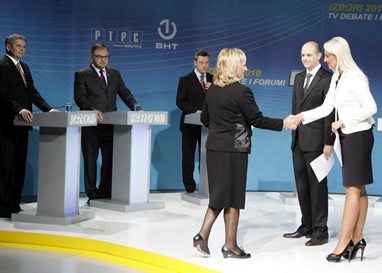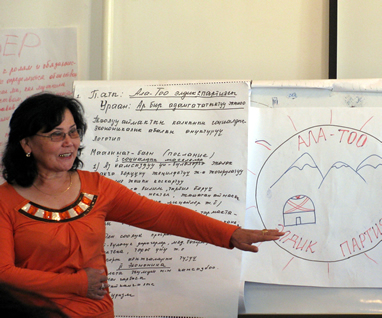|
Preparing for Election Day - Debating, Educating Assessing

Candidates greet the moderators before debating in Bosnia.
Though the voting part of an election usually takes just a day, months and sometimes years of preparation go into making it a success. There's the preparatory work by election commissions, organizing by political parties, choosing candidates, the campaign itself, training observers, educating and motivating the electorate to participate, and creating an atmosphere in which voters feel safe enough to go to the polls. In many countries where NDI works, the Institute and its partners are involved in one or more of these aspects of election day preparation. Here are some examples:
Leading up to the Oct. 3 general elections in Bosnia, NDI partnered with two major public television stations to present a series of candidate debates.
These events, along with a series of regional town-hall style meetings, were unique for focusing on issues, and the parties' stances on those issues, rather than personal or ethnic attacks and accusations.
As Egypt prepares for legislative elections in November, a new website, www.vote4egypt.com, conveys the importance of voting. It features promotional get out the vote videos, posters and message boards, where users can discuss topics such as how to get voter identification cards and where to vote on election day. The site is part of a larger civic participation effort by the nonpartisan Bridge Center for Dialogue and Development, an NDI partner organization.
| |
 A trainer gives a presentation about her political party in Kyrgyzstan.
|
Before Kyrgyzstan's Oct. 10 parliamentary elections, NDI worked with women candidates and party members seeking to learn new skills needed to be effective candidates, and for gaining leadership roles within their parties.
In preparation for Afghanistan's Sept. 18 parliamentary elections, NDI conducted orientation sessions for more than 1,700 candidates (68 percent of the total), organized training for political parties, ran campaign schools for more than 240 women candidates (62 percent of the total) and provided technical assistance to FEFA, the country's largest domestic election monitoring organization. It also trained more than 36,000 candidate agents across the country to report on election day activities.
In addition to its work with local partners, NDI takes part in pre-election assessments. Recently in Jordan,
Ukraine and Nigeria, the Institute has fielded high-level delegations that have met with election officials, ruling and opposition political figures, civil society groups, journalists and others to assess the electoral environment and recommend short- and long-term improvements in the electoral process.
|
|
In Haiti, Citizens Voice Ideas and Concerns about Rebuilding
Haiti's Action Plan for National Recovery and Development is a blueprint aimed at helping Haitians rebuild and overcome the challenges posed by last January's earthquake. To ensure that citizens and local government officials have an opportunity to contribute their own ideas, initiative committees across Haiti are holding meetings to solicit advice from citizens. Read more»
Despite Violence, Voters in Afghanistan Show Commitment to Democratic Process
Although violence marred the electoral process in many parts of the country, millions of Afghans turned out to vote in legislative elections Sept. 18, showing courage and resolve to move their nation toward a more democratic future. NDI's observers released a preliminary statement lauding Afghans for their commitment to democracy while drawing attention to a number of problems with the electoral process. Read more»
New Publications Encourage Women's Political Participation
In many countries, women who want to get involved in politics lack the role models and resources to help them pursue their goals. Two new publications seek to meet those needs and encourage more women to get involved in the political process.
Aimed at young women from the Middle East and North Africa region, Confidence, Capacity, Connections: A Young Woman's Guide to Leadership is a workbook that combines ideas, strategies and advice from experts on pursuing a political career. Read more»
In Bangladesh, Who's Who: Women Leaders at a Glance profiles 134 Bangladeshi women and is designed to provide inspiration and role models to other women aspiring to leadership roles. Read more»
|
|
Iraqi National Youth Caucus Works to Turn Youth Priority Issues into Policy Changes
As Iraqis work to create a new government, a group of young people is working to perfect the civic advocacy skills they need to influence how policy is made. Members of Iraq's National Youth Caucus (NYC) came together recently to discuss their strategies for ongoing advocacy campaigns for improving high school and college education and combating the high rate of youth unemployment. Read more»
Central American Leaders See Transparency as Key to Public Security
In El Salvador, Guatemala and Honduras, more than three quarters of the population thinks public safety is the greatest problem facing the region. Recently, leaders from government, political parties, business, academia and civil society came together to discuss the link between transparency and security in Central America. At the NDI-supported event, the 150 participants identified and agreed on concrete actions to fight corruption and increase transparency. Read more»
New Partnerships Strive for More Inclusive, Stronger Parliaments
NDI recently signed two memoranda of understanding (MoU) that seek to strengthen parliaments and make them more accountable and inclusive.
In Kenya, NDI and the Commonwealth Parliamentary Association signed an MoU to collaborate on efforts to enhance representative government around the world. The association is a group of national and subnational legislatures of the Commonwealth, representing some two billion citizens from all faiths and ethnicities from six continents. Read more»
The MoU signed by NDI and the Guatemalan Congress will allow the two to create initiatives to improve the representation of indigenous people and women in Guatemala's government and to reform laws governing elections and political parties. Read more»
|



